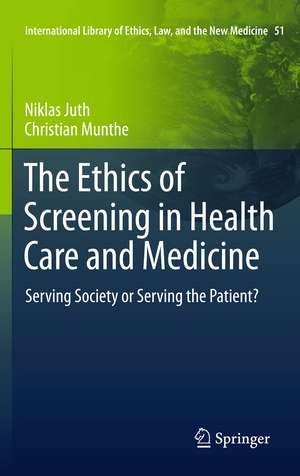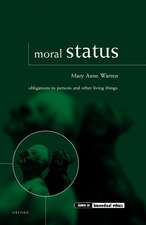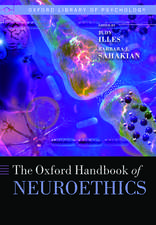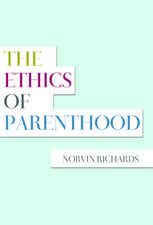The Ethics of Screening in Health Care and Medicine: Serving Society or Serving the Patient?: International Library of Ethics, Law, and the New Medicine, cartea 51
Autor Niklas Juth, Christian Muntheen Limba Engleză Paperback – 27 noi 2013
This book involves an in-depth analysis of the ethical, political and philosophical issues related to health-oriented screening programs. It explores the considerations that arise when heath care interacts with other societal institutions on a large scale, as is the case with screening: What values may be promoted or compromised by screening programs? What conflicts of values do typically arise – both internally and in relation to the goals of health care, on the one hand, and the goals of public health and the general society, on the other? What aspects of screening are relevant for determining whether it should be undertaken or not and how it should be organised in order to remain defensible? What implications does the ethics of screening have for health care ethics as a whole?
These questions are addressed by applying philosophical methods of conceptual analysis, as well as models and theories from moral and political philosophy, medical ethics, and public health ethics, to a large number of ongoing and proposed screening programs which makes this book the first comprehensive work on the ethics of screening. Analyses and suggestions are made that are of potential interest to health care staff, medical researchers, policy makers and the general public.
| Toate formatele și edițiile | Preț | Express |
|---|---|---|
| Paperback (1) | 939.62 lei 43-57 zile | |
| SPRINGER NETHERLANDS – 27 noi 2013 | 939.62 lei 43-57 zile | |
| Hardback (1) | 945.62 lei 43-57 zile | |
| SPRINGER NETHERLANDS – 21 sep 2011 | 945.62 lei 43-57 zile |
Din seria International Library of Ethics, Law, and the New Medicine
- 5%
 Preț: 347.29 lei
Preț: 347.29 lei -
 Preț: 397.25 lei
Preț: 397.25 lei - 15%
 Preț: 635.31 lei
Preț: 635.31 lei - 18%
 Preț: 942.76 lei
Preț: 942.76 lei - 5%
 Preț: 718.65 lei
Preț: 718.65 lei - 15%
 Preț: 634.68 lei
Preț: 634.68 lei - 15%
 Preț: 637.78 lei
Preț: 637.78 lei -
 Preț: 380.07 lei
Preț: 380.07 lei - 18%
 Preț: 959.98 lei
Preț: 959.98 lei - 15%
 Preț: 641.20 lei
Preț: 641.20 lei - 18%
 Preț: 944.19 lei
Preț: 944.19 lei - 15%
 Preț: 636.80 lei
Preț: 636.80 lei - 15%
 Preț: 643.00 lei
Preț: 643.00 lei - 18%
 Preț: 952.89 lei
Preț: 952.89 lei - 15%
 Preț: 643.48 lei
Preț: 643.48 lei - 18%
 Preț: 954.45 lei
Preț: 954.45 lei - 5%
 Preț: 1095.73 lei
Preț: 1095.73 lei - 15%
 Preț: 645.79 lei
Preț: 645.79 lei - 18%
 Preț: 1111.22 lei
Preț: 1111.22 lei - 15%
 Preț: 643.84 lei
Preț: 643.84 lei - 18%
 Preț: 1227.67 lei
Preț: 1227.67 lei - 18%
 Preț: 953.65 lei
Preț: 953.65 lei - 15%
 Preț: 638.57 lei
Preț: 638.57 lei - 5%
 Preț: 1101.21 lei
Preț: 1101.21 lei
Preț: 939.62 lei
Preț vechi: 1145.89 lei
-18% Nou
Puncte Express: 1409
Preț estimativ în valută:
179.79€ • 188.22$ • 148.77£
179.79€ • 188.22$ • 148.77£
Carte tipărită la comandă
Livrare economică 07-21 aprilie
Preluare comenzi: 021 569.72.76
Specificații
ISBN-13: 9789400738126
ISBN-10: 9400738129
Pagini: 192
Ilustrații: X, 182 p.
Dimensiuni: 155 x 235 x 17 mm
Greutate: 0.28 kg
Ediția:2012
Editura: SPRINGER NETHERLANDS
Colecția Springer
Seria International Library of Ethics, Law, and the New Medicine
Locul publicării:Dordrecht, Netherlands
ISBN-10: 9400738129
Pagini: 192
Ilustrații: X, 182 p.
Dimensiuni: 155 x 235 x 17 mm
Greutate: 0.28 kg
Ediția:2012
Editura: SPRINGER NETHERLANDS
Colecția Springer
Seria International Library of Ethics, Law, and the New Medicine
Locul publicării:Dordrecht, Netherlands
Public țintă
ResearchCuprins
Acknowledgements.- Chapter 1: Introduction.- 1.1 The Wilson and Jungner Criteria.- 1.2 Point and Plan.- 1.3 The Concept of Screening.- Chapter 2: Why Screening?.- 2.1 Screening, Treatment and Prevention: Preliminary Remarks.- 2.2 Health: Life and Well-being.- 2.2.1 Health and Counselling.- 2.2.2 The Good of People and of the Population.- 2.3 Autonomy.- 2.3.1 Respecting and Promoting Autonomy.- 2.3.2 Promoting Autonomy through Screening.- 2.4 Justice.- 2.5 Summary.-Chapter 3: Screening – What, When and Whom?.- 3.1 Diseases and Groups.- 3.1.1 Prenatal Screening.- 3.1.2 Neonatal Screening.- 3.1.2.1 Reasons for Screening in the Neonatal Period.- 3.1.2.2 Neonatal Screening and Parental Informed Consent.- 3.1.2.3 Expanding Neonatal Screening – How Far?.-3.1.3 Child and Adolescent Screening.-. 3.1.3.1 Stigmatisation.-3.1.3.2 The Child as Decision Maker.-3.1.4 Adult Screening.- 3.2 Testing and Analysis.-3.2.1 Safety.-3.2.2 Validity.-
3.2.3 Predictive Value.- 3.3 Treatments.-3.3.1 Abortion as Treatment.-3.3.2 Counselling as Treatment.- 3.4 Summary.-Chapter 4: Screening – How?.- 4.1 Informed Consent.-4.2 Counselling.-
4.2.1 Genetic Counselling as a Template.-4.2.2 Expansion: Shared Decision Making.- 4.3 Funding and Participation.-
4.4 Summary.-Chapter 5: Case Studies.- 5.1 Non-Invasive Prenatal Diagnosis.-5.2 Neonatal Screening for Fragile X.-
5.3 Mammography Screening.-5.4 PSA Screening for Prostate Cancer.-Chapter 6: Serving Society or Serving the Patient?.-6.1 Summary of the Analysis So far.-6.2 The Public Health – Health Care Tension Area.-6.3 The Relevance of a Social Science Perspective.-6.4 An Institutional Approach to health-related Ethics: A Sketch.-6.5 Applying the Institutional Approach: Three Cases.-
6.5.1 Institutions, Functions and Ethics: Reproductive Care vs. Communicable Disease.- 6.5.2 Direct to Consumer Genetic Testing: The Limits of Context Relativity.-6.5.3 Screening and Justice: The Case Against Allocating Health Care Resources to Screening.- 6.6 Revisiting the Wilson and Jungner Criteria for Screening.- 6.7 Closing
3.2.3 Predictive Value.- 3.3 Treatments.-3.3.1 Abortion as Treatment.-3.3.2 Counselling as Treatment.- 3.4 Summary.-Chapter 4: Screening – How?.- 4.1 Informed Consent.-4.2 Counselling.-
4.2.1 Genetic Counselling as a Template.-4.2.2 Expansion: Shared Decision Making.- 4.3 Funding and Participation.-
4.4 Summary.-Chapter 5: Case Studies.- 5.1 Non-Invasive Prenatal Diagnosis.-5.2 Neonatal Screening for Fragile X.-
5.3 Mammography Screening.-5.4 PSA Screening for Prostate Cancer.-Chapter 6: Serving Society or Serving the Patient?.-6.1 Summary of the Analysis So far.-6.2 The Public Health – Health Care Tension Area.-6.3 The Relevance of a Social Science Perspective.-6.4 An Institutional Approach to health-related Ethics: A Sketch.-6.5 Applying the Institutional Approach: Three Cases.-
6.5.1 Institutions, Functions and Ethics: Reproductive Care vs. Communicable Disease.- 6.5.2 Direct to Consumer Genetic Testing: The Limits of Context Relativity.-6.5.3 Screening and Justice: The Case Against Allocating Health Care Resources to Screening.- 6.6 Revisiting the Wilson and Jungner Criteria for Screening.- 6.7 Closing
Recenzii
“The description of the different types of screeningoffered to the population is characterized by a high level of completeness andexhaustive documentation. It includes the most recent developments in thisfield, offering even to non-expert readers the possibility of acquiring a goodlevel of knowledge. … All the chapters of the book are full of complete andupdated information from the scientific literature, using language accessibleto non-experts, and integrated with useful notes.” (Lorenzo Simonato, TheoreticalMedicine and Bioethics, Vol. 36, 2015)
“The book that came into being is the first comprehensive work on the ethical issues related to screening in medicine. … The Ethics of Screening in Health Care and Medicine is practical philosophy at its best: scientifically well informed, balanced, carefully argued and highly relevantfor the practice of medicine and health care.” (Pekka Louhiala, Medicine, Health Care and Philosophy, February, 2012)
“This book broadly investigates the ethics associated with screening programs done in both clinical and public health settings. … The audience may include advanced ethics students, scholars, practitioners, and especially health policymakers (particularly those involved in the establishment and evaluation of screening programs). … This book may be of interest to individuals searching for more guidance on Wilson and Jungner’s principles … .” (Bradley Steven Olsen Thornock, Doody’s Review Service, March, 2012)
“The book that came into being is the first comprehensive work on the ethical issues related to screening in medicine. … The Ethics of Screening in Health Care and Medicine is practical philosophy at its best: scientifically well informed, balanced, carefully argued and highly relevantfor the practice of medicine and health care.” (Pekka Louhiala, Medicine, Health Care and Philosophy, February, 2012)
“This book broadly investigates the ethics associated with screening programs done in both clinical and public health settings. … The audience may include advanced ethics students, scholars, practitioners, and especially health policymakers (particularly those involved in the establishment and evaluation of screening programs). … This book may be of interest to individuals searching for more guidance on Wilson and Jungner’s principles … .” (Bradley Steven Olsen Thornock, Doody’s Review Service, March, 2012)
Textul de pe ultima copertă
Medical or health-oriented screening programs are amongst the most debated aspects of health care and public health practices in health care and public health ethics, as well as health policy discussions. In spite of this, most treatments of screening in the research literature restrict themselves to isolated scientific aspects, sometimes complemented by economic analyses or loose speculations regarding policy aspects. At the same time, recent advances in medical genetics and technology, as well as a rapidly growing societal focus on public health concerns, inspires an increase in suggested or recently started screening programs.
This book involves an in-depth analysis of the ethical, political and philosophical issues related to health-oriented screening programs. It explores the considerations that arise when heath care interacts with other societal institutions on a large scale, as is the case with screening: What values may be promoted or compromised by screening programs? What conflicts of values do typically arise – both internally and in relation to the goals of health care, on the one hand, and the goals of public health and the general society, on the other? What aspects of screening are relevant for determining whether it should be undertaken or not and how it should be organised in order to remain defensible? What implications does the ethics of screening have for health care ethics as a whole?
These questions are addressed by applying philosophical methods of conceptual analysis, as well as models and theories from moral and political philosophy, medical ethics, and public health ethics, to a large number of ongoing and proposed screening programs which makes this book the first comprehensive work on the ethics of screening. Analyses and suggestions are made that are of potential interest to health care staff, medical researchers, policy makers and the general public.
This book involves an in-depth analysis of the ethical, political and philosophical issues related to health-oriented screening programs. It explores the considerations that arise when heath care interacts with other societal institutions on a large scale, as is the case with screening: What values may be promoted or compromised by screening programs? What conflicts of values do typically arise – both internally and in relation to the goals of health care, on the one hand, and the goals of public health and the general society, on the other? What aspects of screening are relevant for determining whether it should be undertaken or not and how it should be organised in order to remain defensible? What implications does the ethics of screening have for health care ethics as a whole?
These questions are addressed by applying philosophical methods of conceptual analysis, as well as models and theories from moral and political philosophy, medical ethics, and public health ethics, to a large number of ongoing and proposed screening programs which makes this book the first comprehensive work on the ethics of screening. Analyses and suggestions are made that are of potential interest to health care staff, medical researchers, policy makers and the general public.
Caracteristici
Makes a seminal contribution to scientific discussion as well as public debate Applies a novel analytical approach through its combination of theoretical perspectives and richness of practical cases Informs both medical science, health research and societal policy making. Critically assesses a host of practices that directly concern most, if not all, ordinary citizens. Provides models for decision making regarding the starting and running of, as well as participation in, health-oriented screening programs.


















